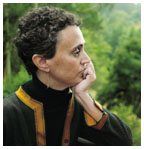|
Web Exclusives: Alumni Spotlight April 6, 2005
Laurie Lola Vollen ’78 comes to aid of exonerated prisoners More than 50 people in the United States are exonerated every year of serious crimes, including rape and murder, that they never committed. Until two years ago, most of these individuals — freed because of their innocence, not procedural missteps — left prison with little or no money, few or no job skills, and often no home to return to. Laurie Lola Vollen ’78 is trying to change that. Since 2003 Vollen has helped more than 100 former prisoners get back on their feet through the Life After Exoneration Program, a Berkeley, Calif.-based organization she co-founded that helps these individuals re-enter society. Vollen helps them find jobs and housing, and provides access to medical care and mental-health counseling. That kind of support, says Vollen, means “the difference between having a life and being a prisoner of isolation and destitution.” A doctor with a subspecialty in public health, Vollen initially took a more conventional approach to her medical career, working in private practice and then serving as director of Arizona State University’s health center. But a three-week Christmas vacation spent setting up a childhood vaccination system in Somalia in 1992 convinced her that she needed to change direction. Since then she has made a habit of coming to the aid of victims of injustice. From 1996 to 2000, Vollen worked in Bosnia with Physicians for Human Rights. She started a countrywide exhumation program to dig up the mass graves of massacre victims and, through DNA technology, identify the dead so that their families could begin to get on with their lives. That experience led her to establish the Center for Communities Emerging from Injustice (CCEI), a nonprofit organization based in Berkeley that focuses on addressing the needs of communities that arise from social injustice and human-rights abuses. Inter-nationally, CCEI is working to ensure the appropriate use of DNA identification technology in the aftermath of ethnic cleansing and genocide. Domestically, CCEI developed the Life After Exoneration Program (www.exonerated.org), which is the only organization addressing the post-release needs of the wrongfully convicted in the United States. The experiences of individuals wrongly imprisoned resemble those of torture survivors, says Vollen. Prison systematically denies inmates their freedom and rights and is “physically and psychologically abusive,” says Vollen, a psychology major at Princeton. One man she helped, Calvin Willis, served 22 years in Louisiana for a rape that he never committed. He was released in 2003. Through Vollen’s intervention, a pastor introduced Willis to leaders in the community, and other residents donated clothing and an automobile, and helped him renovate his grandmother’s house. Out of prison for about a year, he’s now employed, says Vollen, “and the community has embraced him.” “I am outraged by injustice,” says Vollen, who still
practices medicine one day a week and is a visiting scholar at the
Institute for International Studies at the University of California,
Berkeley. Whether it’s identifying bodies in Bosnia or helping
innocent exonerees re-enter society, she tries to do some good in
the wake of wrongs committed. It’s an opportunity, she says,
“to help those who have fallen victim to civilization’s
evil side.” By K.F.G.
|
||

